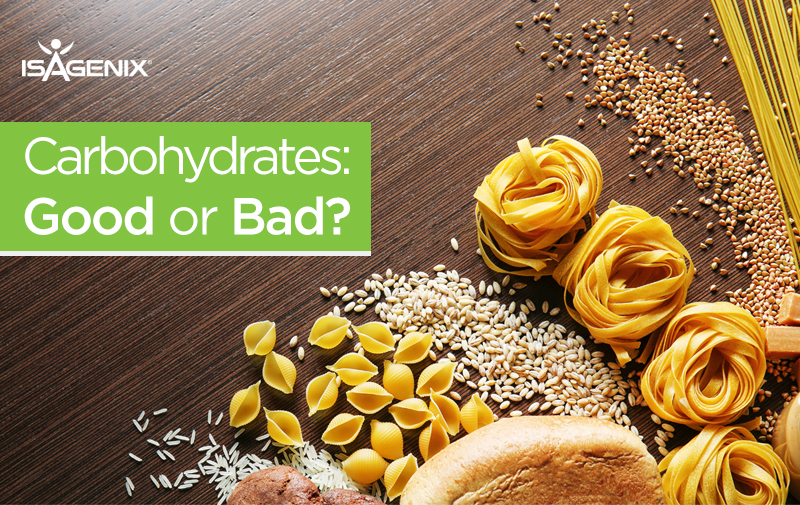Are Carbs More Fattening Than Fat?
August 14, 2017,
isagenix

Avoiding carbs is becoming a major food trend. Between updated menus and celebrity diets, more health-conscious individuals are ditching the carbs found in potatoes, bread, rice, pasta and other grains, and opting to eat more fat instead. But are carbohydrates as fattening as we think they are?
Weight loss and weight gain are all to do with energy balance (1). If you are consuming more energy (calories) than your body needs, it leads to weight gain over time. These calories can come from any of the macronutrients – carbohydrates, fat, or protein – as they all provide the body with energy. However, they don’t all provide the body with equal amounts of energy.
Carbohydrates = 3.7 kcal per gram
Protein = 4 kcal per gram
Fat = 9 kcal per gram
Alcohol also provides energy, at 7 kcal per gram, and though there are no recommendations that any amount of energy should come from alcohol, it’s important to remember that alcoholic drinks still add to your daily calorie intake (2).
Considering that carbohydrates provide the least amount of energy per gram, it seems unlikely that this is what’s causing us to gain weight. Let’s look at how we tend to consume foods that are rich in carbohydrates: perhaps a potato roasted in oil, spreading butter on your toast, or eating pasta in a creamy sauce. Are you seeing a theme here? We tend to combine starchy foods with high-fat ingredients, and this makes the meal much higher in calories. This may be where the link between carbohydrates and weight gain comes from. In reality, if these starchy foods aren’t cooked in or served with high-fat ingredients, then they are relatively low in calories.
The theory that including starchy foods in your diet causes significant weight gain is not supported by science and, as fat contains more than double the calories per gram that carbohydrate, consuming high-fat foods is more likely to cause weight gain (3).
There is evidence to suggest that eating low-fat, starchy foods within a calorie-controlled diet can help with weight loss, particularly when we’re choosing whole-grain or high-fibre versions (3).
How can you include starchy carbs in your diet and still achieve your goals?
- When you aren’t replacing a meal with an IsaLean® Shake aim to include a starchy carbohydrate. This could be in the form of breakfast cereals, oats, potatoes, bread, rice, pasta, or quinoa.
- If you can, look at the recommended serving size on the food label and measure out your portion before you start cooking.
- Prepare with as little fat as possible and experiment with herbs and spices to add flavour. Try using a spray oil to roast potatoes, opt for tomato or other vegetable-based sauces with pasta, and when you’re eating out, choose boiled or steamed rice rather than fried rice.
References
- Skidmore P. Macronutrient intakes and their role in obesity. Nutr Bull 2007;32 (suppl 1):4-13
- Public Health England. McCance and Widdowson’s composition of foods integrated dataset: user guide. Available at: https://www.gov.uk/government/uploads/system/uploads/attachment_data/file/417175/McCance___Widdowson_s_Comp_of_Foods_Integrated_Dataset_User_Guide.pdf (accessed 27/07/2017)
- Jebb S. Carbohydrates and obesity: from evidence to policy in the UK. Proc Nutr Soc 2014;74:215-220




